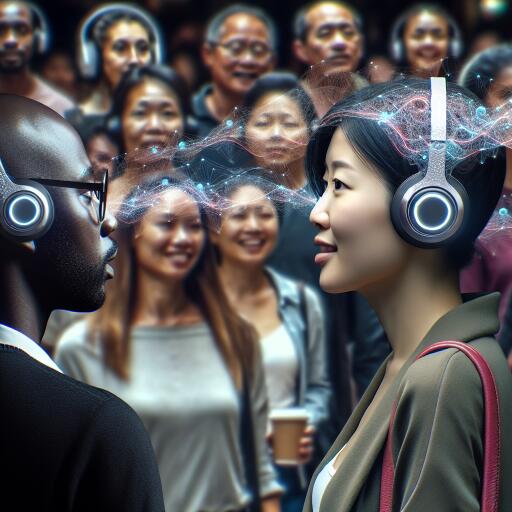The Revolution in Sound: AI Headphones That Focus on Who You Listen to in a Crowd
In an era where noise-canceling headphones have evolved to create an escape into auditory solitude, the quest for innovation takes on a new direction—giving control over who we listen to, amidst the chaos of surrounding sounds. Researchers at the University of Washington have made a groundbreaking advancement in artificial intelligence and audio processing, introducing a system that allows users to isolate and listen to a single speaker in a noisy environment simply by looking at them.
This novel technology, dubbed “Target Speech Hearing” (TSH), was unveiled at the ACM CHI Conference on Human Factors in Computing Systems in Honolulu. What makes TSH a standout is its simplicity and effectiveness. By wearing headphones equipped with this AI system, a user can “enroll” a speaker’s voice by focusing on them for just three to five seconds. The system then filters out all other noises, channeling only the chosen speaker’s voice directly to the listener, even if they move around or lose visual contact.
The core of this innovation lies in its user-centric approach to sound processing. Shyam Gollakota, a senior author of the study and a professor at the Paul G. Allen School of Computer Science and Engineering, emphasizes the departure from conventional AI applications. “Our project brings AI into the auditory experience, allowing users to control their sound environment in ways that were previously impossible,” Gollakota shared. This technology aims to transform how we interact in noisy settings, enabling clear communication regardless of background noise.
The operation of TSH is elegantly straightforward. Users, through commercial headphones fitted with a microphone, initialize the system by pressing a button while facing the intended speaker. The headset then captures the sound waves from the speaker’s voice, utilizing machine learning software to identify and isolate the speaker’s voice patterns. As a result, the listener can clearly hear the enrolled speaker without the interference of background noise.
In testing with 21 subjects, the technology proved its potential, delivering a listening experience that was nearly twice as clear compared to without the filter. This research not only paves the way for future auditory AI technologies but also expands the possibilities for enhancing communication in various noisy environments.
Despite its impressive capabilities, the current version of the TSH system has its limitations. It can register only one speaker at a time and requires an absence of other loud voices in the same direction as the target speaker. However, users can re-enroll speakers to refine voice clarity and intelligibility.
The team behind this revolutionary system envisions its application extending beyond headphones to earphones and even hearing aids, promising a new horizon in hearing technology. With funding from various prestigious awards and support, the research continues to evolve, driven by the goal of making personal audio environments as customizable as our playlists.
For more insights into this game-changing technology, or to explore the publicly available code, interested parties can reach out to the University of Washington’s dedicated research team.
As we stand on the brink of a new era of auditory experience, the Target Speech Hearing system beckons us to imagine a world where listening is not just about hearing, but about focusing on what truly matters amidst the noise of life.










